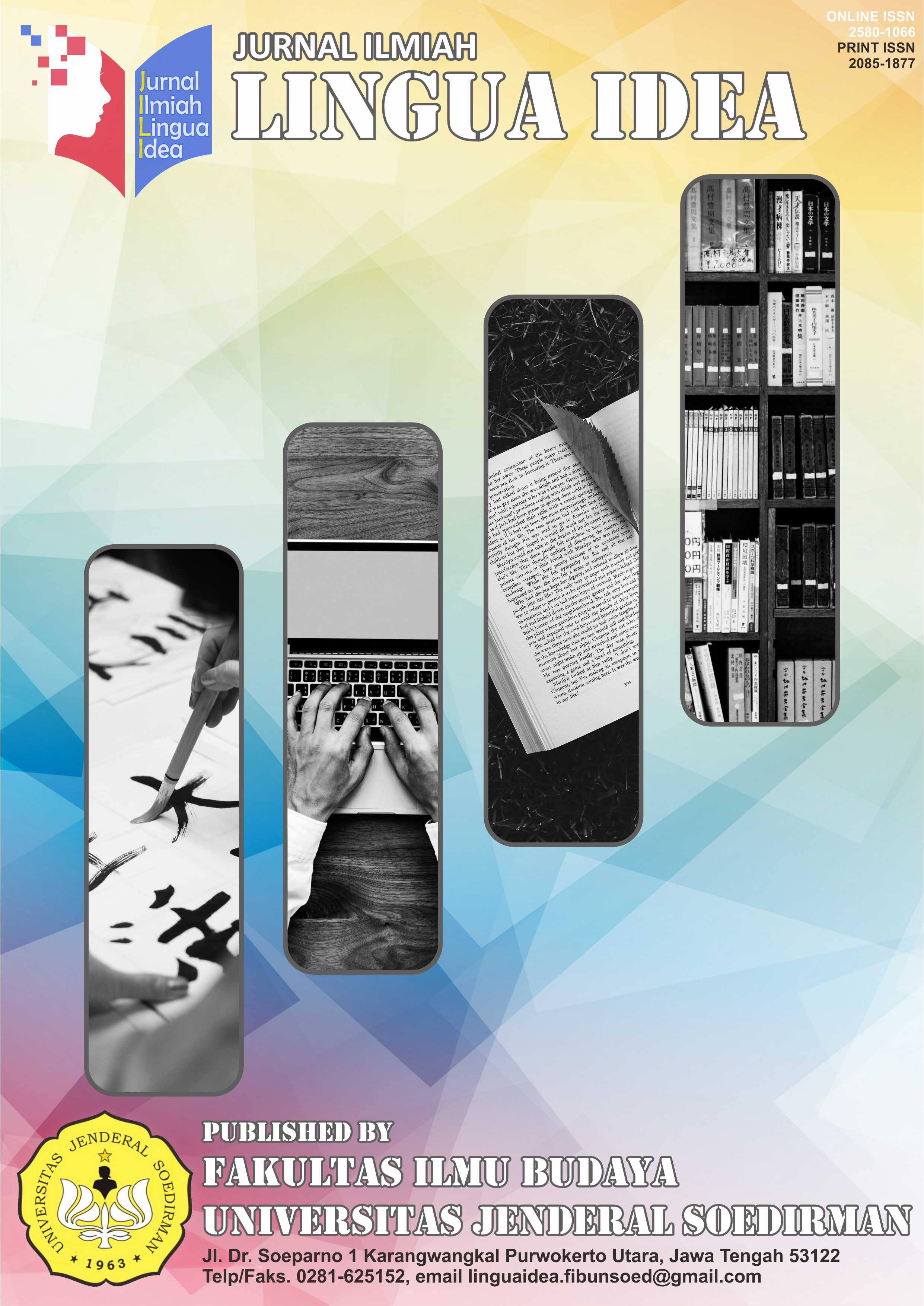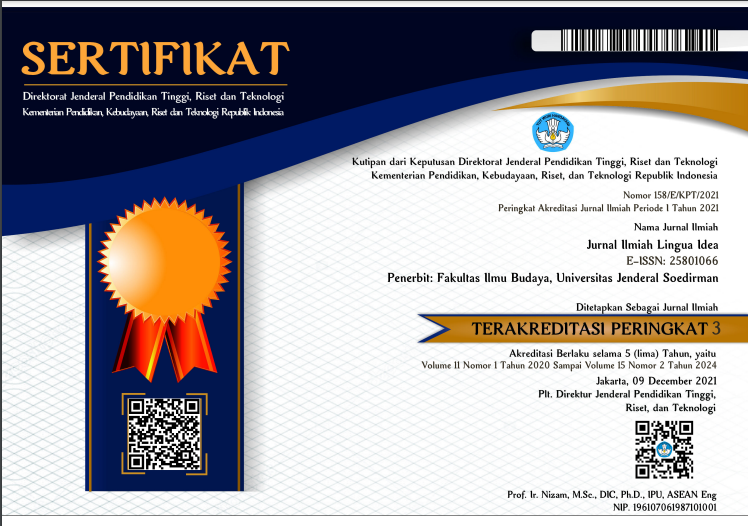Immigrant’s Cultural Alienation in Elaine Chiew’s Face
Abstract
This research focuses on the cultural alienation of an elderly Chinese immigrant narrated in Elaine Chiew’s Face (2019). Face is a story that highlights the life of Yun, an elderly Chinese woman who moves to London and feels alienated from her surroundings. To analyze the data, the descriptive qualitative method and Seeman’s theory of alienation (1959) are employed. This research discovers that alienation undergone by elderly can be resulted from powerlessness, meaninglessness, normlessness, isolation, and self-estrangement. Powerlessness rises when the elderly immigrants could not cope with bullying problem, while feeling meaninglessness comes from their inability in doing productive activities like what they had in their home-land. Incapability to adapt with the culture, norms, and values in the host-country results in their normlessness detaching them more from their surroundings. It worsens due to the language barrier, no same-aged friends, and geriatric bladder issues. Lastly, their social functions that do not work well lead them into self-estrangement. The findings of this research show that cultural alienation experienced by elderly immigrants could lead them into identity crisis.
References
Arlene Michaels Miller, D. B. S. Z. E. W. O. S. and J. C. (2009). Neighborhood Immigrant Concentration, Acculturation, and Cultural Alienation in Former Soviet Immigrant Women. Journal of Community Psychology, 37, 88–105.
Creswell, J. W & Miller, D. L. (2000). Determining Validity in Qualitative Inquiry. Theory intoPractice. 39 (3). Page 124-131
Dhone, V. (2019). Rootlessness and Alienation in The Novels of Arun Joshi. 6(1), 589–592.
Elaine Chiew. (2019). The Heartsick Diaspora and Other Stories. Penguin Random House.
Fukuyama, F. (2018). Identity: The Demand for Dignity and the Politics of Resentment. Picador.
Haoache, Amal. G. J. (2021). Alienation and Identity Crisis in Kiran Desai’s The Inheritance of Loss. Mohamed Boudiaf.
Hossain, Md. A. (2021). Muslims in Diaspora: Negotiating Identity in Nadeem Aslam’s Maps for Lost Lovers. South Asian Review, 42(1), 94–108. https://doi.org/10.1080/02759527.2020.1772634
Islam, S. (2019). Alienation in Tagore’s “Banshi”: An Analysis from Melvin Seeman’s Theoretical Perspective. 23(May), 70–80.
Jost, J. T. (2006). The end of the end of ideology. American Psychologist, 61(7), 651.
Mahbub, R. M. (2021). Alienation in the Historical Perspective: The Origin and the Cause. A Journal of Literature Arts and Culture, 6, 71–86.
Marinova, D. (2013). Cultural Alienation in the Ageing Person. Psychological Thought, 6(2), 264–282. https://doi.org/10.5964/psyct.v6i2.63
Martin, J. (2022). Intercultural Communication in Contexts. New York: McGraw Hill.
Murniati, T. (2014). Indonesian Migrant Writing: A Trace on Indonesian Diaspora Narratives.nhttps://www.academia.edu/7339657/
Mustafa, Goran Omar (2019). Alienation in And Mountains Echoed by Khaled Husseini. 10th International Visible Conference on Educational Studies & Applied Linguistics.
Nguyen, D. (2003). Socio-cultural Alienation Among First Generation Elderly Vietnamese Immigrants Living in Australia. Australian Catholic University.
Orville, S. (1989). Review of The Joy Luck Club, by Amy Tan. https://www.nytimes.com/1989/03/19/books/the-joy-luck-club.html
Paudel, R. P. (2016). Unhomely Home: Cultural Encounter of Diaspora in Jhumpa Lahiri’s The Namesake. NUTA, 70–76.
Sandelowski, M. (2000). Whatever Happened to Qualitative Description? Research in Nursing & Health, 23, 334–340.
Seeman, M. (1959). On the Meaning of Alienation. American Sociological Association, 24, 783–791.
Shree, V. B. (2013). Exile and Cultural Alienation in Anita Desai’s Bye- Bye Blackbird - An Analysis. The Dawn Journal, 2, 247–255.
Smaili, N. & S. S. (2019). Alienation in Paul Bowles’s The Spider’s House (1954). Université Mouloud Mammeri Tizi Ouzou.
Tan, Amy. (1989). Joy Luck Club. New York: G. P Putnam’s Sons
Trisnawati, R. K. (2022). “Please don’t Treat Me Like A Servant. I Do Have My Rights”: Indonesian Migrant Domestic Workers (IMDWS) Wrote in “Familiar Strangers” (2018). 10, 69–77.
Zaheer, J. (2018). We Went Out to Explore, but Gained Nothing but Illness: Immigration Expectations, Reality, Risk and Resilience in Chinese-Canadian Women with a History of Suicide-Related Behaviour. Springer, 1–31.

This work is licensed under a Creative Commons Attribution-ShareAlike 4.0 International License.
Authors who publish with Jurnal Ilmiah Lingua Idea agree to the following terms:
- Authors retain copyright and grant the journal right of first publication with the work simultaneously licensed under a Creative Commons Attribution License (CC BY-SA 4.0) that allows others to share the work with an acknowledgment of the work's authorship and initial publication in this journal.
- Authors are able to enter into separate, additional contractual arrangements for the non-exclusive distribution of the journal's published version of the work (e.g., post it to an institutional repository or publish it in a book), with an acknowledgment of its initial publication in this journal.
- Authors are permitted and encouraged to post their work online (e.g., in institutional repositories or on their website) prior to and during the submission process, as it can lead to productive exchanges, as well as earlier and greater citation of published work.






















.png)






